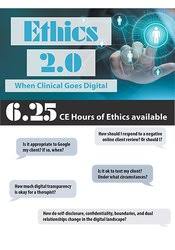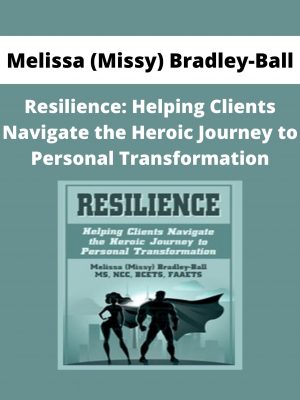Jeff Ashby – Ethics 2.0 When Clinical Goes Digital
$119 Original price was: $119.$33Current price is: $33.
Shopping Instructions:
- DISCOUNT 15% : SHOP15
- Product Delivery: Within 1 – 12 hours after purchase.
But working within the complex and rapidly changing world of technology has left many clinicians feeling uncertain how to offer quality, ethical mental health treatment.
Jeff Ashby – Ethics 2.0 When Clinical Goes Digital
Digital Technology Has Changed the Way We Serve our Clients.
In this booming age of social media, digital information, and electronic communication, clients have grown accustomed to being able to receive every imaginable service using technology as the format – including their interactions with you, their clinician.
But working within the complex and rapidly changing world of technology has left many clinicians feeling uncertain how to offer quality, ethical mental health treatment.
Renowned ethics expert Jeff Ashby, PhD, ABPP, RPT-S has devoted 20+ years of his career to ensuring clinicians like you understand—and can effectively apply in practice—the essential legal and ethical best-practices for utilizing technology with clients.
Now you can join Dr. Ashby in this unique online training course that explores today’s ethical issues related to social media, blogs, websites, and more.
Using humor, story-telling, case studies, and exercises, Jeff will equip you with the information necessary to identify possible areas of negligence within your practice, address complex ethical dilemmas, and establish ethical practices that ensure client safety, confidentiality, and quality mental health services. You’ll end this training confident in your ability to address complex ethical dilemmas while maintaining the highest standards of clinical practice.
Are you using “the most up to date” encryption standards when storing and communicating client information?
Do you have an appropriate relationship to the readers of your blog or followers on your social media sites?
Are you breaking HIPAA and not even realizing it?
If you find yourself wondering about questions like these, this is the course for you! This insightful and comprehensive online training will help you establish clear ethical guidelines and practices when using technology in your work with clients. You’ll identify:
- Potential road blocks that can occur within the client-therapist relationship when there’s a difference in digital/social comprehension.
- The ethical decision making process you follow and the potential risks inherent in different ethical theories.
- The limitations of your competence and how you would defend them if challenged
Would you like to receive Jeff Ashby – Ethics 2.0 When Clinical Goes Digital ?
- Discuss the five primary purposes of ethics
- Understand the importance of knowing and understanding current codes, laws, and rules in relationship to technology
- Consider the possible—and implied—fiduciary relationships to your clients and the gray area technology brings
- Learn the risk of malpractice and negligence in today’s world
- Uncover whether you are a digital native or a digital immigrant—and learn to identify what your clients are to enhance your therapeutic work
- Learn what makes something an ethical dilemma
- Review the two levels of moral reasoning and how they can impact your decisions
- Have a complete understanding of informed consent—it’s much more than “a form clients sign”
- Understand the potential gray areas with technology and distance counseling/tele-mental health
- Recognize what it means to be competent in something and where you draw the lines in your own practice
- Understand the difference between supervision and consultation
- Learn the challenges with confidentiality when living in an age of information
- Be able to analyze the use of email and texting in your own practice and identify areas where you may be breaking confidentiality
- Understand what qualifies as dual or multiple relationships and how they (or an interaction) could be interpreted by someone else
- Learn the importance of controlling your web visibility and the potential impact of posted information
- Understand the four different kinds of self-disclosure and what to consider when you choose to do so
- Be confident in how you establish appropriate relationships with clients—off and online
Related products
HEALTH & MEDICAL
HEALTH & MEDICAL
Regina Meredith – Conscious Media Network with Regina Meredith – Eric Pearl on The Reconnection
HEALTH & MEDICAL
HEALTH & MEDICAL
Gaia—Creating-High-Voltage-Health-with-Glenn-Streeter-Open-Minds
HEALTH & MEDICAL
Matthew Troester – How Much Sleep Do We Need and How to Get It
HEALTH & MEDICAL












